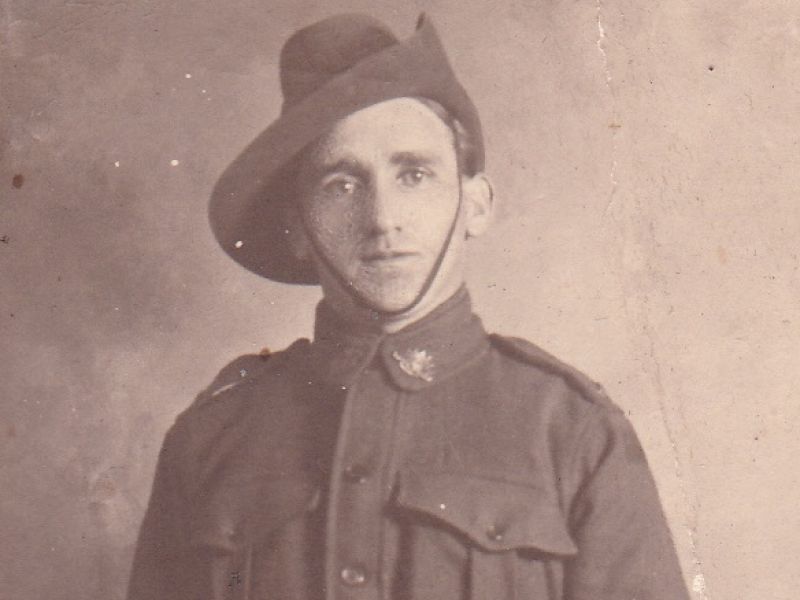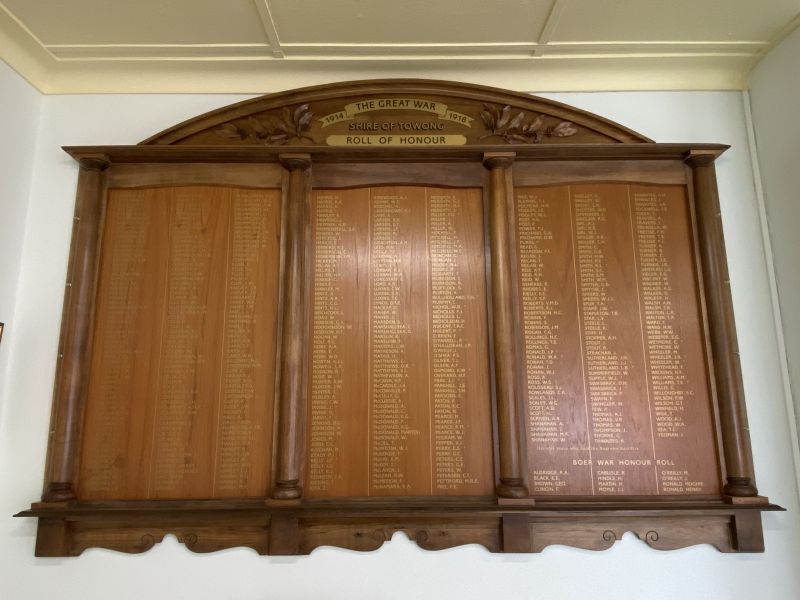Henry (Harry) Ellis
Harry was born on the 2nd of January 1893 at Eskdale, Victoria. He was one of eleven children of William and Eupemia (Agnes) (née Owen) Ellis. Two of Harry’s siblings passed away before the age of one.
In 1913 Harry married Harriet Sieble Butler. In April of 1914 their first child was born, Morsley Henry, followed in 1915 by their daughter, Isobelle Rose. Both were born in Tallangatta, Victoria.
Harry enlisted in Melbourne on the 4th of August, 1915. He was allocated the Regimental Number 3540 and placed in the 11th Reinforcements for the 6th Battalion. His first five weeks in uniform was spent at the Depot at Albert Park. The 11th Reinforcements embarked on HMAT A71 Nestor at Melbourne on the 11th of October, 1915 and sailed for Egypt.
In late January of 1916, Harry was admitted to the 4th Auxilary Hospital At Cairo suffering from the mumps. Three weeks later he returned to his unit. Their training in Egypt at an end, he embarked on HT Transylvania at Alexandria at the end of March, arriving at Marseilles in the south of France on the 4th of April. Men arriving in France were sent to the 1st Australian Base Depot at Etaples, where they underwent further training. Harry was eventually taken on strength with the 6th Battalion on the 17th of May. His first taste of action would also be the first major battle fought by Australian troops on the Western Front. It would become known as the battle of Fromelles.
Fromelles would be a disaster for the Allied armies and have no overall impact upon the progress of the Somme Offensive. The primary objective was to draw German troops away from the Somme offensive further south. A seven-hour preliminary bombardment took away any aspect of surprise that the attacking troops may have had. The battle lasted a little over fourteen hours. The 5th Division suffered 5533 casualties leaving it incapable of an offensive action for many months. Harry was wounded in the hand during the battle and, after a short stay at No. 2 Australian Field Ambulance, was admitted to No. 8 Stationary Hospital at Wimereux, near Boulogne, France.
After a period at No. 1 Convalescent Depot, he rejoined the battalion on the 16th of October, 1916. A little over a month later, he was admitted again to hospital. While boiling water for tea, the billy had slipped and boiling water scalded his right leg. The burns were serious enough to warrant him being sent to hospital in England. After spending nearly four months recovering in hospital, Harry was given two weeks leave in England. He reported to Perhams Downs Camp on the 24th of March, 1917, and was immediately classified as B1A, fit for garrison service abroad (B1) and able to march, see to shoot, hear well and stand active service conditions (A). After nearly two months of guard and light duties at Bhurtpore Barracks, Tidworth, Harry was sent back to France where he rejoined his unit on the 8th of June, 1917.
He had been back with the battalion for a little over a month when he was admitted back into hospital, the cause of his illness being unknown. Back to the hospital train. Back to England. In the space of four months he passed through one casualty clearing station, an ambulance train, a hospital ship, two general hospitals and two command depots. On the 6th of February, 1918, Harry marched in to the Divisional Overseas Training Brigade. It was here that men who were returning to active service underwent physical and military training to prepare them for the front.
By this stage, Harry had spent nearly twenty months away from front line service with his battalion. He decided, that as he was still in England, he might as well have a little bit of extra leave and on the 14th of February he went absent without leave. He returned to his Brigade on his own doing to await what the military heirachy had in store for him. He was awarded seven days of Field Punishment No. 2 and forfeited twelve days pay.
In the Australian Army there were two categories of field punishment. Fiedl punishment No. 1 consisted of heavy labouring duties, possible being restrained in handcuffs or fetters, and being tied to a post or wheel. Field punishment No. 2 differed in that the soldier was not attached to a fixed object. On the 4th of March, Harry proceeded overseas to France to rejoined his battalion.
Not long after Harry rejoined the 6th Battalion, German forces launched their Spring Offensive (Operation Michael). The objective was to drive a wedge between English and French forces. The 1st Division faced the German onslaught at the village of Strazeele, near the Belgium border. The battalion War Dary records that the 25th of April was a quiet day on the front. It had managed to slightly advance their line and two strong platform posts had been dug. Casualties during the construction of the posts, as described in Harry’s Red Cross File by Private S.G. Currie (2836), a member of A Company.
“He (Harry) was in A.Coy., and I saw him wounded in front of Strazeele when he was hit by a piece of shell in the head. He became unconscious and was taken to a dressing station some time afterwards. He was digging a post in front of the front line at time of casualty, which happened early in the morning, the date of which I am not quite sure …”
Harry was buried in the Ebblinghem Military Cemetery, France. He is also remembered at the Australian War Memorial Roll of Honour, and the Boer War and WW1 Roll of Honour at Tallangatta, Victoria. For his service he was awarded the 1914-15 Star, the British War Medal and the Victory Medal.
On the 24th of April, 1919, the following poem appeared in the Upper Murray and Mitta Herald newspaper.
“ELLIS. - In sad and loving memory of my dear husband and our father, Private Harry Ellis, 6th Battalion, who died of wounds recieved at Strazelle [sic], France, on 28th April, 1918.
We pictured his safe returning,
And longed to clasp his hand;
But God has postponed our meeting -
It will be in a better land.
Only a bundle of letters -
All that is left to me;
But my husband who died for his country
Ever lives in our memory.
Only some lines from the trenches,
With the hand of the writer grown cold;
But the name that is writ on those papers
Is graven in letters of gold.
His duty nobly done.
- Inserted by his sorrowing wife and little son and daughter, Morsley and Rsie Ellis.”

 Stephen Learmonth
Stephen Learmonth